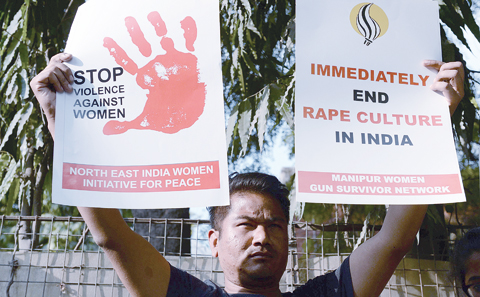Nearly 11,000 cases of child rape reported in India in 2015 - 21 million 'unwanted' girls in India
 NEW DELHI: File photo shows an Indian social activist holding placards during a protest against a rape at Hauz Khas village in New Delhi. —AFP
NEW DELHI: File photo shows an Indian social activist holding placards during a protest against a rape at Hauz Khas village in New Delhi. —AFPNEW DELHI: An eight-month-old Indian girl was yesterday recovering in hospital after she was raped at her home in Delhi, the latest such case in a country notorious for high levels of sexual violence. The girl's parents rushed her to hospital after discovering her bed covered in blood when they returned from work on Sunday. She later underwent a three-hour operation for her injuries. The Press Trust of India said the girl's 27-year-old cousin had been arrested and charged under the Protection of Children from Sexual Offences Act, meaning he could face a life sentence. "The worst has happened," tweeted Swati Maliwal, the head of the Delhi Commission for Women, after visiting the girl in hospital.
"An eight-month-old baby has been brutally raped in the Capital and is battling for her life in a hospital." A UN Committee on the Rights of the Child in 2014 said one in three rape victims in India was a minor and expressed alarm over the widespread sexual abuse of children. Nearly 11,000 cases of child rape were reported in India in 2015, according to the National Crime Records Bureau's latest figures. It said three children were raped every day in Delhi alone. The city, known as India's rape capital, hit global headlines in 2012 for the fatal gang-rape of a young female student.
'Unwanted' girls
Meanwhile, some 21 million girls in India are "unwanted" and receive fewer resources because their parents wanted a son, the government said, as analysts called for action to boost women's earnings. The government's annual economic survey, presented to parliament on Monday with a pink cover, included a chapter on women's issues for the first time - emblazoned #MeToo in recognition of the global campaign against sexual harassment. "India must confront the societal preference, even meta-preference for a son, which appears inoculated to development," it said. While India is set to regain its position as the world's fastest growing major economy, development "has not proved to be an antidote" for its skewed sex ratio, lack of women in the workplace and low contraceptive use, the survey said.
A sex ratio of 943 females per 1,000 males has led to the identification of some 63 million "missing" women, it said. While sex-selection abortions are widely prevalent despite a ban, the preference for sons also manifests in parents choosing to keep having children until they have sons, leading to an estimated 21 million "unwanted" girls, the survey noted. "Consigning these odious categories to history soon should be society's objective," it said. "A son 'meta' preference ... may be detrimental to female children because it may lead to fewer resources devoted to them."
Many parents prefer sons because they can inherit property while families have to pay dowries when their daughters marry. Only 24 percent of women in India were employed in 2015-16 and almost 47 percent do not use any contraception, it said. Analysts welcomed the government's acknowledgement of the challenges to gender justice, but said it must do more to ensure equal rights for women. "There is no recognition of the failure of economic policy with respect to women's rights and women's work - including unpaid labor," said Jayati Ghosh, a professor of economics at the Jawaharlal Nehru University in Delhi.
"They are also not doing enough to stop violence against women, which is seriously limiting women's labor participation," she told the Thomson Reuters Foundation. Nearly two-thirds of Indian women with college degrees are without jobs, and female labor force participation is among the lowest in the world, according to World Bank data. Ensuring property rights for women, and ending gender stereotyping in Indian popular culture can also help, said women's rights activist Kamla Bhasin. "It is not just the government; we need to tackle the entrenched patriarchy at every level. Otherwise, the message is: women are not equal to men."- Agencies










